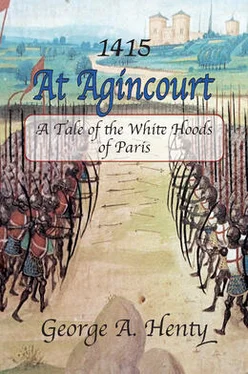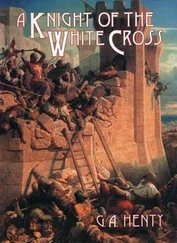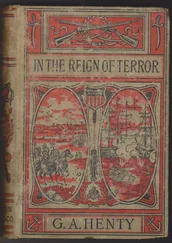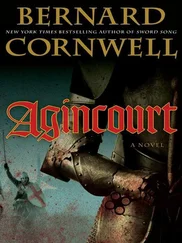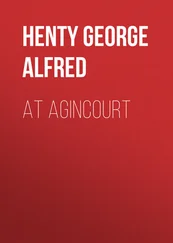“It is too late, indeed, to fly, even if we wished to,” Guy said. “Dame Margaret and the children retired to bed an hour ago. Will you take this ring,” and he took off from his finger one that D'Estournel had given him, “and carry it at once to the lodgings of Count Charles d'Estournel? They are in the house on this side of the Hotel of St. Pol. He is still up, and has some of his friends with him. Tell him from me that this house is being attacked, and beg him to gather a party, if he can, and come to our assistance. Say that we shall defend it until the last.”
The girl took the ring and ran off at the top of her speed. The roar of the distant crowd could now be distinctly heard. Guy put up the strong bars of the door and then rushed upstairs. First he knocked at the door of Maitre Leroux.
“The butchers are coming to attack your house!” he shouted. “Call up your servants; bid them take to their arms.” Then he ran up to the room where his men slept. Long Tom, who had met him at D'Estournel's door and accompanied him home, sprang to his feet from his pallet as Guy entered. “The butchers are about to attack the house, Tom; up all of you and arm yourselves; bring down your bow and arrows. Where do the men-servants sleep?”
“There are five of them in the next room, and the two who serve in the shop are in the chamber beyond,” the archer replied, as he hastily buckled on his armour. Guy rushed to the door and awoke the inmates of the rooms, telling them to arm and hasten down to defend the house, which was about to be attacked. A moment later Maitre Leroux himself appeared and repeated the order.
“Art sure of what you say, Master Guy?” he asked.
“Look from the window and you will see them approaching,” Guy replied, and going to the casement window which was at the front of the house he threw it open. Some four hundred yards away a dense throng was coming along; a score of torches lighted up the scene.
“Resistance is vain,” the silversmith said. “It is my life they seek; I will go down to them.”
“Resistance will not be in vain,” Guy said firmly. “I have already sent for aid, and we shall have a body of Burgundian men-at-arms here to our assistance before long. Your life will not satisfy them; it is the plunder of your shop and house that they long for, and you may be sure that they will put all to the sword if they once break in. Now let us run down and see what we can do to strengthen our defences.”
“The shutters and doors are all strong,” the provost said as they hurried downstairs, followed by the four men-at-arms and the servants—for in those days men removed but few of their garments as they lay down on their rough pallets.
“In the first place,” Guy said, “we must pile everything that we can find below against these doors, so that when they yield we can still make a defence here, before we retire. Are there other stairs than these?”
“No.”
“So much the better. As soon as we have blocked the door we will barricade the first landing and defend ourselves there. Jean Bart, do you take the command below for the present. Seize everything that you can lay hands on, logs from the wood-store, sacks of charcoal, cases, everything heavy that you can find, and pile them up against the door. Tom, do you come with us; an arrow or two will check their ardour, and it is not likely they have brought bows or cross-bows with them. Try to parley with them as long as you can, Maitre Leroux, every minute is of value.”
“What is all this, Guy?” Dame Margaret asked as she entered the apartment. Having been aroused by the noise she had hastily attired herself, and had just come into the front room.
“The butchers are about to attack the house, lady; we are going to defend it. I have sent to D'Estournel, and we may hope for aid before long.”
At this moment there was a loud knocking at the door and a hoarse roar of voices from the street. The silversmith went to the casement and opened it, and he and Guy looked out. A shout of fury arose from the street, with cries of “Death to the English spies!” “Death to the Armagnac provost!”
Leroux in vain endeavoured to make his voice heard, and so tell the crowd that his guests were not spies, but had been lodged at his house by the Duke of Burgundy himself. A tall man on horseback, one of several who were evidently leaders of the mob, pressed his way through the crowd to the door and evidently gave some orders, and a din of heavy sledge-hammers and axes beating against it at once mingled with the shouts of the crowd. The horseman crossed again to the other side of the street and shook his fist threateningly at Leroux.
“That is Jacques Legoix,” the silversmith said, as he retired from the window; “one of the great leaders of the butchers; his family, and the St. Yons and Taiberts rule the market.”
“Tom,” Guy said to the archer, who was standing behind him. “Begin by picking off that fellow on horseback opposite.”
Tom had already bent his bow and had an arrow in readiness, a moment later the shaft flew and struck the butcher between the eyes, and he fell dead from his horse. A yell of consternation and rage rose from the crowd.
“Now you can distribute a few arrows among those fellows at the door,” Guy said.
The archer leant far out of the low casement. “It is awkward shooting, Master Guy,” he said quietly, “but I daresay I can make a shift to manage it.” Disregarding the furious yells of the crowd, he sent arrow after arrow among the men using the sledges and axes. Many of them had steel caps with projecting rims which sheltered the neck, but as they raised their weapons with both hands over their heads they exposed their chests to the marksman above, and not an arrow that was shot failed to bring down a man. When six had fallen no fresh volunteers came forward to take their places, although another horseman made his way up to them and endeavoured by persuasions and threats to induce them to continue the work. This man was clad in armour, and wore a steel cap in the place of the knightly helmet.
“Who is that fellow?” Guy asked the merchant.
“He is the son of Caboche, the head of the flayers, one of the most pestilent villains in the city.”
“Keep your eye on him, Tom, and when you see a chance send an arrow home.”
“That armour of his is but common stuff, Master Guy; as soon as I get a chance I will send a shaft through it.”
The man with a gesture of anger turned and gave instructions to a number of men, who pushed their way through the crowd, first picking up some of the fallen hammers and axes. The fate of his associate had evidently taught the horseman prudence, for as he moved away he kept his head bent down so as not to expose his face to the aim of the terrible marksman at the window. He halted a short distance away and was evidently haranguing the crowd round him, and in his vehemence raised his arm. The moment he did so Tom's bow twanged. The arrow struck him at the unprotected part under the arm-pit, and he fell headlong from his horse. Maddened with rage the crowd no longer hesitated, and again attacked the door. Just as they did so there was a roar of exultation down the street as twelve men brought up a solid gate that they had beaten in and wrenched from its hinges from a house beyond.
[Illustration: “TOM'S BOW TWANGED, AND THE ARROW STRUCK THE HORSEMAN UNDER THE ARM-PIT.”]
“You can shoot as you like now, Tom. I will go down and see how the men are getting on below; the mob will have the door in sooner or later.”
Guy found that the men below had not wasted their time. A great pile of logs, sacks, and other materials was piled against the door, and a short distance behind stood a number of barrels of wine and heavy cases ready to be placed in position.
Читать дальше
